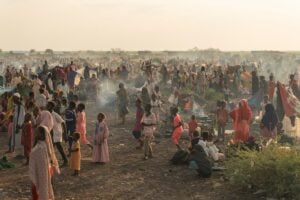International community condemns war crimes in Sudan
An international human rights coalition has issued a statement on the sidelines of the 58th session of the United Nations Human Rights Council. The statement, endorsed by dozens of international, regional, and Sudanese organizations, calls for urgent action to protect civilians in Sudan and to halt the violations, abuses, and war crimes committed by the Sudanese army and its allied terrorist and extremist groups.
It also demands an immediate cessation of the armed conflict that has been devastating Sudan since April 2023. This initiative follows recent international statements and appeals condemning the alarming deterioration of the humanitarian and human rights situation, particularly in the strategic city of Wad Madani in Al-Jazira State, which came under Sudanese army control in January.
According to President of the Future Youth Coalition, the humanitarian situation in Sudan has reached a critical level. The ongoing conflict has resulted in the forced displacement of over 14 million people, with nearly 3 million seeking refuge in neighboring countries. The crisis has affected approximately 25 million Sudanese, including 14 million children, many of whom are facing severe food insecurity and limited access to healthcare. Furthermore, more than 37% of the population is experiencing acute food shortages and a critical lack of essential humanitarian assistance.
Sudan is currently experiencing one of the most severe humanitarian and displacement crises globally, with nearly 150,000 civilians, including a significant number of women and children, losing their lives. The President of the Sudanese Human Rights Organizations Coalition and a co-signatory of the statement, confirmed that 90 international, regional, and Sudanese non-governmental organizations have endorsed the declaration. Among them, more than 50 Sudanese and international organizations hold consultative status with the United Nations.
The statement highlights reports of grave human rights violations and abuses allegedly committed by the Sudanese Armed Forces and allied groups in Wad Madani. These violations, documented through various sources, have raised serious concerns within the international community. Reports indicate incidents of extrajudicial killings, summary executions, arson, torture, violence against children, the disposal of bodies in rivers, and enforced disappearances. The statement underscores the urgent need for accountability and enhanced efforts to protect civilians and uphold human rights in Sudan.
The Sudanese Armed Forces and their allies have reportedly committed numerous grave atrocities upon entering the city of Wad Madani, resulting in at least 146 civilian casualties, based on initial estimates. Videos captured by eyewitnesses and widely circulated on social media depict serious violations and acts of violence against innocent civilians. Allegations against members and commanders of the Sudanese Armed Forces include extrajudicial killings, summary executions, torture, and systematic targeting based on ethnic identity. These reported acts may constitute crimes against humanity and war crimes, underscoring the urgent need for accountability in accordance with international law.
The United Nations High Commissioner for Human Rights, Volker Türk, expressed deep concern, stating, “I am alarmed by reports of the arbitrary execution of civilians by the Sudanese Armed Forces and their allied militias. It is crucial that an immediate investigation be conducted into these atrocities to ensure accountability and justice.” Recently, the United States imposed sanctions on the commander of the Sudanese Armed Forces, accusing him of obstructing the democratic process.
A delegation representing the Sudanese Human Rights Organizations Coalition and the Future Youth Coalition submitted the international statement to the Office of the United Nations High Commissioner for Human Rights. The delegation urged the High Commissioner to prioritize the ongoing humanitarian crisis in Sudan and to ensure its regular inclusion in the High Commissioner’s reports to the Human Rights Council, in accordance with agenda items 2 and 4 of the Council’s proceedings. The delegation further called on the International Commission of Inquiry on Sudan to document all crimes and violations committed by the Sudanese Armed Forces and their allies, and to press the de facto military government to grant the Commission unrestricted access to operate across all regions of Sudan.
In addition, the delegation emphasized the need to strengthen international mechanisms for ensuring accountability of Sudanese military leaders for war crimes against civilians, with the aim of holding them accountable before international criminal tribunals. The statement urged the international community to prioritize the situation in Sudan, with an immediate call for a ceasefire and the resumption of negotiations among all warring parties, without delay and without preconditions.
A swift transition to a democratic civilian government is imperative to ensure a peaceful transfer of power, facilitate the effective delivery of humanitarian aid, and ensure the safe and voluntary return of displaced persons. In addition, it is crucial to reinstate and strengthen health and education systems, providing essential services to all citizens without discrimination, while addressing the dire humanitarian and livelihood needs of the population.
This international statement, issued at the outset of the United Nations Human Rights Council session, represents the most significant and expansive global response to the crisis in Sudan. Launched during the international event “Death Coffins in Sudan,” held at the United Nations Human Rights Square, the statement has been widely disseminated to international bodies and non-governmental organizations. It serves as a vital call for collective action to protect civilians and address the ongoing humanitarian catastrophe in Sudan.
